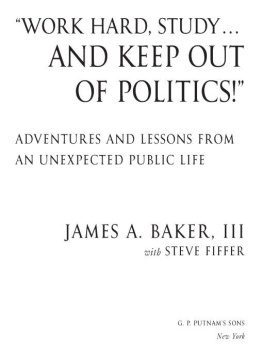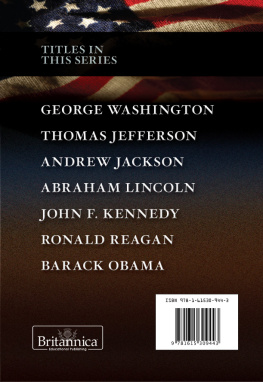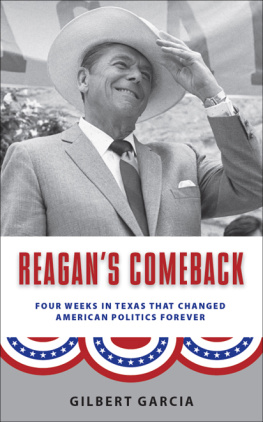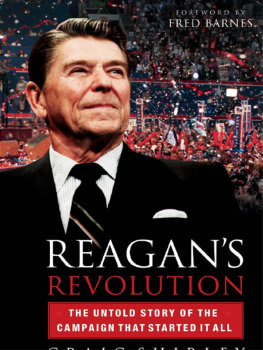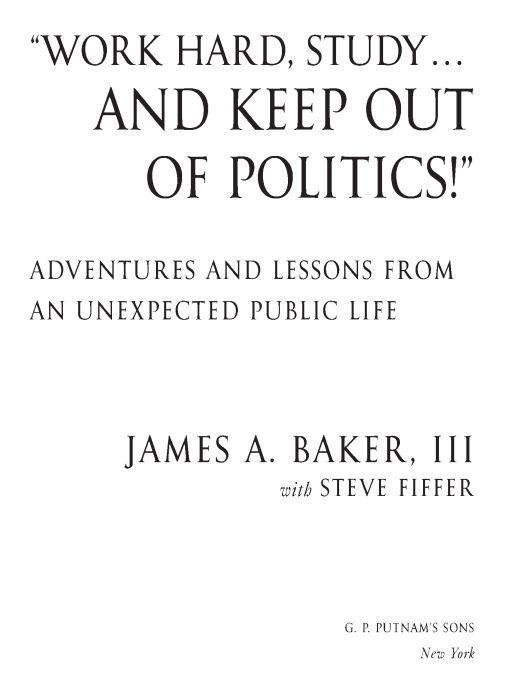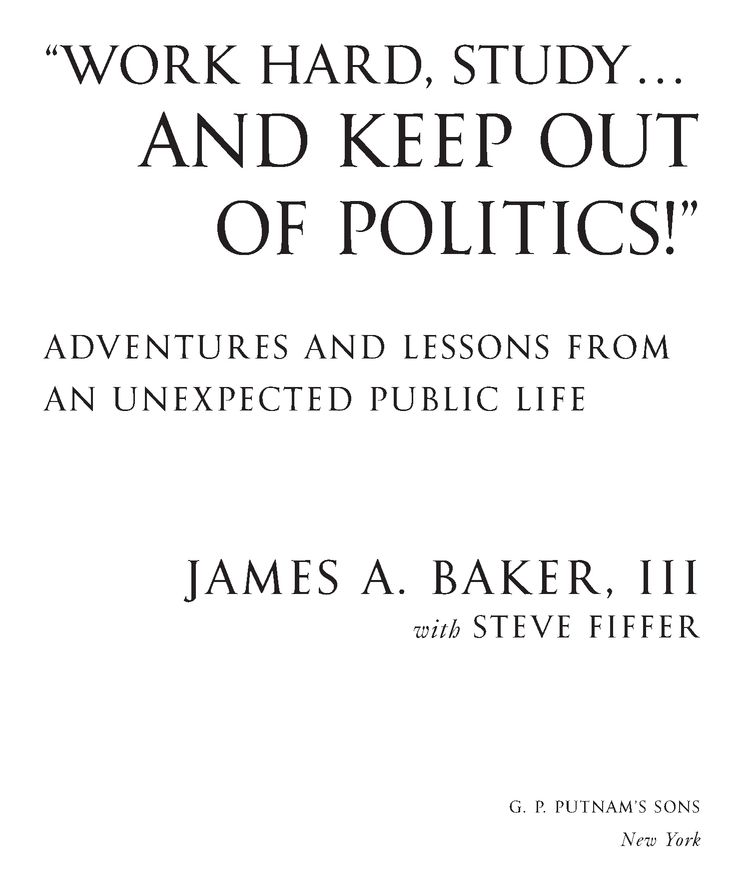Contents
Landmarks
Table of Contents
ALSO BY JAMES A. BAKER, III
The Politics of Diplomacy:
Revolution, War & Peace, 1989-1992 (with Thomas M. DeFrank)
TO THOSE PRESIDENTS OF THE UNITED STATES
WHO GAVE ME THE OPPORTUNITY TO EXPERIENCE
AN UNEXPECTED PUBLIC LIFE
PREFACE
I WAS IN WASHINGTON, D.C., on January 20, 1953, the crisp, sunny day that Dwight David Eisenhower was inaugurated as our nations thirty-fourth president. At the time, I was a twenty-two-year-old second lieutenant in the United States Marine Corps, on leave from nearby Quantico, Virginia. My fiance, Mary Stuart McHenry, of Dayton, Ohio, was in town for a visit before I shipped out. I had joined the Marines platoon leader officer program the summer after my junior year at Princeton, in part to keep from being drafted before I graduated. The Korean War was raging when I signed up, and I fully expected to be sent there.
Strolling down the street arm in arm on the day before the inauguration, very much in love, Mary Stuart and I were stopped by a well-dressed older gentleman. I was wearing my uniform. Lieutenant, he said, thank you for your service. I have a son who is a Marine second lieutenant in Korea. Im wondering, would you and your lady like two tickets to the inaugural parade tomorrow?
Yes, sir, I said to our anonymous benefactor, and thank you.
Mary Stuart and I showed up early the next day to claim our seats and discovered they were on the lip of Lafayette Park, directly across Pennsylvania Avenue from the White House and only a few yards downstream from the presidential reviewing stand. An estimated 750,000 people attended the inaugural festivities that day, and except for President Eisenhower, Vice President Richard Nixon, and the dignitaries and family members with them, we had some of the best seats in town.
As floats and marching bands streamed by, I clicked away with my 35mm camera. I still have the slides, including one of President Eisenhower and John Foster Dulles, soon to be sworn in as secretary of state, as they drove past, and another of a cowboy roping the president in the reviewing stand. Newspaper accounts said the parade lasted about four hours. I cant remember if we stayed until the end, but I doubt it. The dignitaries (and Mary Stuart) all wore heavy overcoats, but I had on only a light uniform jacket. Whatever the weather, however, it was a great experience. Mary Stuart and I had no idea what the months ahead might bring, but that day we were happy and thankful.
Twenty-eight years later another president-elect took the oath of office, this time on the terrace of the west front of the Capitol. I was privileged to attend both the inauguration ceremony and the parade that followed. This time, I didnt sit across from the parade reviewing stand, however; I sat in it. I was to be Ronald Reagans White House chief of staff, charged with helping turn his ideas about the economy and defense into legislative and political realities. To those who knew me my first fifty years, my presence at this 1981 inauguration was as unexpected as my presence at Ikes, and I was just as surprised.
After my two-year tour of active duty with the Marines and three years of law school, I had dedicated myself to a career in a major Houston law firm. In my time away from the demands of the office, I was more interested in serving a tennis ball than serving in a government job or a political campaign.
What finally blew my life off its more-or-less conventional course was a deep personal tragedy in early 1970. Afterward, a Republican friend invited me to get involved in my first political campaignhis losing bid for the U.S. Senate that same year. I threw myself into this new and exciting project, and if politics didnt exactly save my life, it certainly helped preserve my sanity. When Ronald Reagan was sworn in as president, that friend, George H. W. Bush, was sworn in as vice president. Later that day, he came up to me, smiling.
Bake, he said, whoda thunk it?
WHO, INDEED?
Few have had the opportunity to serve six American presidentstwo in the military and, decades later, three in senior government positions, then one more on several special projects. In my first book, The Politics of Diplomacy: Revolution, War & Peace, 1989-1992, I wrote in detail about how the world changed, dramatically and fundamentally, during my four years as secretary of state under the first President Bush. While revisiting some of those events in this second book, my aim here is to tell the story of my journey from Houston, Texas, to Washington, D.C., then around the world, and to share memories of the political campaigns, the presidential administrations in which I served, and the other offices I held.
But I hope to do more. Ive now lived more than three-quarters of a century, some in private life, some in public service. Im more at ease when Im getting things done in the world of action than in stirring the ashes of the past and writing about what it all meant. Still, Ive learned some lessons (often the hard way) and worked out some ideas about politics and public policy. While Im telling the story of my life, of what happened, Ill also share a few of these lessons and ideas. But what I offer in this book are not grand theories; they are the lessons from one mans hard-won experiences during a long and varied life.
SOON AFTER Mary Stuart and I watched the inaugural parade of one of the great war leaders of the twentieth century, now my commander in chief, I shipped out from Quantico. The Corps sent me to the Mediterranean, not Korea. My months of service with the Sixth Fleet and the reinforced battalion of Marines that the United States maintains in the Mediterranean, even to this day, were not unpleasant and, obviously, were considerably less dangerous than even a few days in Korea. That bloody conflict occupies a hazy zone in our national consciousness between the glory of World War II and the disappointment of Vietnam, and is too often forgotten. Its something I never forget, however, because many of my classmates from Marine Corps Basic Schoolmen I knewsacrificed their lives on the Korean peninsula. I survived and they didnt, which still triggers a bit of guilt.
We have no say in choosing our parents. I was fortunate to grow up in Houston in a loving home under comfortable circumstances. Having gone away from home for two years of prep school, then on to Princeton, I entered the Marines as an immature young man. I left with more personal discipline and with a greater sense of purposethe products of military training, of facing up to what it means to prepare for combat in time of war, and of losing young friends whose potential seemed so limitless.
As the old saying goes, There is no such thing as a former Marine. Early in 1989, after I was sworn in as the sixty-first secretary of state of the United States, the commandant of the Corps paid a courtesy call. When General Al Gray walked into my seventh-floor office at the State Department with his four stars on each shoulder, I had to remind myself that I was no longer a second lieutenant who should stand and salute.
We had a very pleasant visit. Mr. Secretary, I have a gift for you, the general said as he prepared to depart. He left a stack of small business cards with a military camouflage background. In the center of each card in large letters was, James A. Baker, III, United States Marine. And under that, in very tiny letters, and Secretary of State.

